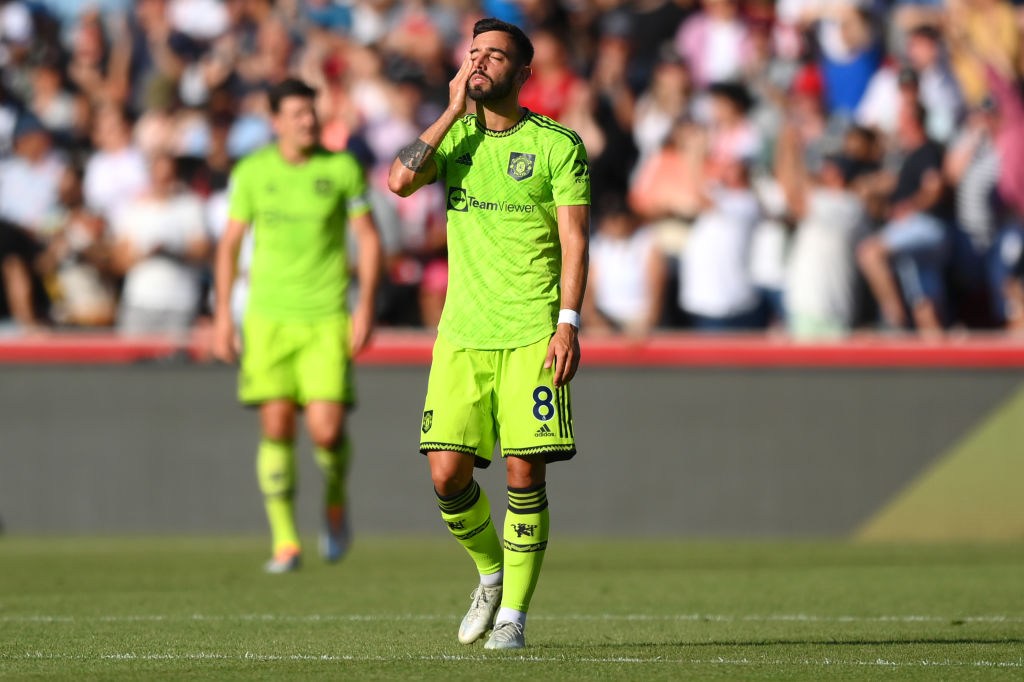Arsenal show what Manchester United are lacking: vision and a whole club’s backing

Those of a Manchester United persuasion raised on their fierce and at times violent rivalry with Arsenal may not like it, but following their calamitous start to the season it may be worth the former looking at their old adversaries for solutions.
Having defined the Premier League around the turn of the millennium, both teams have been left behind in a new era characterised by the impossible wealth of first Chelsea and then Manchester City, and more recently the breathless intensity of Liverpool.
But where Arsenal’s steady progress and perfect start to the new season suggest they have got back on track to being competitive, United have rarely looked more lost than in Saturday’s 4-0 defeat at Brentford, which marked their worst start to a campaign since 1992.
Arsenal’s 4-2 win over Leicester City hours earlier showcased their evolution under Mikel Arteta. From a pragmatic team that played with three at the back and attacked on the counter at the start of his tenure, they have blossomed into a creative, attacking and fluid side.
It didn’t happen overnight. Arteta arrived in December 2019 but had a vision of how he wanted to play and was backed by the club to implement it, even if it meant culling more than a dozen players, including Mesut Ozil and Pierre-Emerick Aubameyang.
Of the XI who started his first match, only two – Granit Xhaka and Bukayo Saka – were in the squad against Leicester.
All successful or at least improving clubs need someone with a vision of what they want to be. At some it might come from a highly engaged owner with distinct ideas, such as Brentford and Brighton, who then hires a sporting director, ensuring consistency of approach.
Chelsea under Roman Abramovich may not have had a stylistic vision but they knew what they were trying to achieve. At other teams with very distinct identities and traditions, such as Ajax, the vision is ingrained in the culture of the club.
Why United are guilty of muddled thinking
For all the veneration of sporting directors, however, many clubs still rely on a manager to set the vision. City constructed a structure of highly competent executives to support him, but the vision belongs to Pep Guardiola.
While Liverpool lean more heavily on the very best data scientists, it is Jurgen Klopp conducting the orchestra.
At Arsenal, it is Arteta. And he has only been granted that control after the grand plan for the post-Arsene Wenger era, involving recruitment guru Sven Mislintat, director of football Raul Sanllehi and manager Unai Emery failed miserably.
It has taken the current manager years to clean it up, but now he has. And it is notable that sporting director Edu Gaspar appears to dance to Arteta’s tune, and not the other way around.
United have a litany of problems, many stemming from their ownership by the Glazer family. Where Arsenal’s US owner, Stan Kroenke, has put money into the club, albeit as loans, United’s have taken out more than £1bn.
Yet arguably their biggest crime has been an abject failure to set a vision for the club – or to hire someone with the imagination and will to do so.
They attempted to go down the sporting director route with Ralf Rangnick, not least because he was credited with having the sort of vision required to arrest the decline. But having hired him for a long-term strategic role, they asked him to manage the team in the interim, he failed miserably and the whole project was torpedoed.
The question now is whether Erik ten Hag has the vision and will to emulate Arteta. And, more pertinently, whether any manager at Old Trafford will be granted that level of influence by a club where muddled thinking appears to reign. The jury is, at best, out on that one.
